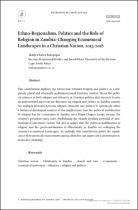| dc.contributor.author | Sakupapa, Teddy Chalwe | |
| dc.date.accessioned | 2022-12-05T10:48:07Z | |
| dc.date.available | 2022-12-05T10:48:07Z | |
| dc.date.issued | 2019 | |
| dc.identifier.citation | Sakupapa, T. C. (2019). Ethno-Regionalism, Politics and the Role of Religion in Zambia: Changing Ecumenical Landscapes in a Christian Nation, 2015-2018, Exchange, 48(2), 105-126. doi: https://doi.org/10.1163/1572543X-12341517 | en_US |
| dc.identifier.uri | https://doi.org/10.1163/1572543X-12341517 | |
| dc.identifier.uri | http://hdl.handle.net/10566/8217 | |
| dc.description.abstract | This contribution explores the interaction between religion and politics in a religiously plural and ethnically multidimensional Zambian context. Given the political salience of both religion and ethnicity in Zambian politics, this research locates an understudied aspect in the discourse on religion and politics in Zambia, namely the multiple relations between religion, ethnicity and politics. It specifically offers a historical-theological analysis of the implications that the political mobilisation of religion has for ecumenism in Zambia since Edgar Chagwa Lungu became the country’s president (2015-2018). Underlining the church-dividing potential of non-theological (doctrinal) factors, the article argues that the ‘political mobilisation of religion’ and the ‘pentecostalisation of Christianity’ in Zambia are reshaping the country’s ecumenical landscapes. Accordingly, this contribution posits the significance of ecumenical consciousness among churches and argues for a contextual ecumenical ecclesiology. | en_US |
| dc.language.iso | en | en_US |
| dc.publisher | Brill | en_US |
| dc.subject | Christian nation | en_US |
| dc.subject | Christianity in Zambia | en_US |
| dc.subject | church and state | en_US |
| dc.title | Ethno-Regionalism, politics and the role of religion in Zambia: Changing Ecumenical landscapes in a Christian nation, 2015-2018 | en_US |
| dc.type | Article | en_US |

